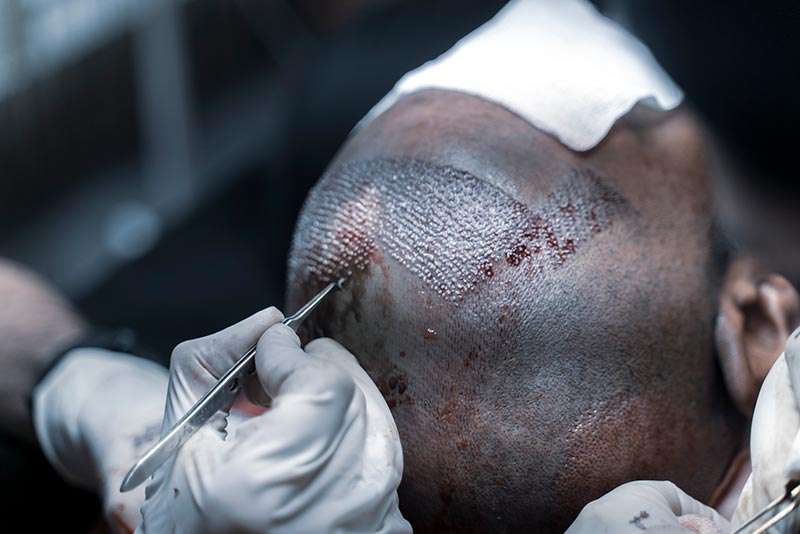Things to Do Before Hair Transplantation
Hair transplantation offers a permanent and effective solution for individuals experiencing hair loss. However, the preparation process before the procedure plays a crucial role in achieving successful results. Pre-transplant preparation ensures the safe execution of the procedure and accelerates the post-transplant recovery process. This preparation phase includes various aspects, from dietary adjustments to medication use, hygiene measures, and psychological readiness.
Preparing for a hair transplant involves taking necessary steps to reduce pre-procedure anxiety and prevent post-procedure complications. Factors such as nutritional habits and medications contribute significantly to the healthy growth of hair follicles. Below, you can find all the details to consider before undergoing a hair transplant.


İÇİNDEKİLER
What Kind of Preparation Process is Required Before a Hair Transplant?
A hair transplant procedure achieves successful results not only on the day of the operation but also through the preparation process beforehand. Proper preparation ensures a more comfortable operation and supports more natural post-transplant results.
Clothing and Accessory Choices Before Hair Transplant
It is recommended to wear comfortable clothing on the day of the operation. Specifically, opt for buttoned or zippered tops that can be put on and taken off without going over your head to prevent damage to the hair follicles. Avoid tight and uncomfortable clothing. Additionally, plan ahead to remove accessories such as jewelry, glasses, or contact lenses, as these need to be taken off before the procedure.
What to Bring on the Day of the Operation
On the day of the operation, it is advisable to bring necessary documents (medical reports, blood test results, etc.). As the procedure may take a long time, you can bring items like a comfortable pillow, a book, or headphones to keep yourself relaxed. It is also essential to follow the instructions provided by the clinic.
Appointment and Clinic Preparations Before Hair Transplant
Before the scheduled appointment, have a detailed consultation with your doctor to finalize the operation plan. Following the preparation steps recommended by the clinic is a crucial part of the process. Ensure that the environment where the procedure will take place meets hygienic standards.

Should You Adjust Your Diet or Nutrition Before Hair Transplantation?
A proper diet is a key part of the preparation process before a hair transplant. A healthy and balanced diet supports the healing of hair follicles and reduces the risk of infection after the procedure.
Alcohol and Caffeine Consumption Before Hair Transplant
Alcohol consumption should be strictly avoided at least 48 hours before the operation. Alcohol thins the blood, increasing the risk of bleeding during the procedure. Similarly, the intake of caffeine-containing beverages should be limited, as caffeine can cause blood pressure fluctuations and lead to unwanted effects during the operation.
Should You Take Vitamin and Mineral Supplements?
Vitamin and mineral supplements can help strengthen hair follicles before the transplant. Supplements like biotin, zinc, and vitamin D are especially recommended. However, it is crucial to take these under medical supervision, as excessive vitamin intake can cause side effects in the body.
The Impact of Healthy Eating on Hair Transplant Success
A balanced diet accelerates the post-procedure recovery process. Antioxidant-rich vegetables and fruits contribute to the healthy growth of hair follicles. Adjusting your eating habits before the hair transplant is essential for achieving long-term results.
Consult Now!
Fill out the form to get detailed information about the hair
transplant process and personalized solutions tailored for you!
The Impact of Healthy Eating on Hair Transplant Success
The use of medications before a hair transplant should be carefully evaluated to prevent any complications during the procedure. Adjusting medications according to your doctor’s recommendations enhances the safety of the operation.
When Should Blood Thinning Medications Be Stopped?
Blood-thinning medications such as aspirin should be stopped before the procedure. These medications can increase the risk of bleeding and cause complications during the operation. Your doctor will provide detailed instructions on when to stop these medications.
Vitamin and Supplement Use Before Hair Transplant
While some vitamins and supplements are recommended before a hair transplant, others should be avoided. For instance, supplements like vitamin E, which have a blood-thinning effect, should not be used before the procedure. However, hair health-supporting supplements like biotin or zinc can be taken with doctor’s approval.
Medications That Could Interfere with Anesthesia
Certain medications may interact with local anesthesia and cause complications during the procedure. Therefore, any regularly used medications should be reviewed by your doctor. If necessary, alternative medications may be recommended.
Stress Management and Psychological Preparation Before Hair Transplantation
Psychological preparation before a hair transplant ensures a smoother experience during and after the procedure. Keeping stress levels under control positively impacts the success of the hair transplant.
What Can Be Done to Reduce Anxiety Before the Procedure?
To reduce anxiety before the operation, breathing exercises, meditation, or light physical activities can be helpful. Additionally, maintaining open communication with your doctor about the process can be effective in alleviating concerns.
The Contribution of Psychological Readiness to the Hair Transplant Process
Being psychologically prepared allows for a more comfortable experience during the procedure. Gaining information about the procedure beforehand reduces anxiety and helps you approach the recovery process more positively.
Pre-Operation Preparation with Relaxation Techniques
Yoga, deep breathing techniques, and relaxation exercises are useful methods to reduce stress levels before the procedure. Regularly practicing these techniques will help you enter the procedure day feeling more prepared.
Hygiene and Scalp Care Before Hair Transplantation
Hygiene is one of the most important factors to consider in the preparation process before a hair transplant. Keeping the scalp clean before the procedure reduces the risk of infection.
Hair Washing Instructions Before Hair Transplant
On the day of the operation, you may be required to wash your hair with a shampoo recommended by the clinic. Keeping the scalp clean helps reduce the risk of infection during the procedure and creates a healthier environment for the operation.
Scalp Cleanliness and Reducing the Risk of Infection
It is essential to pay attention to scalp hygiene before the hair transplant. If there is any irritation or infection on the skin, the procedure may be postponed. Therefore, regularly cleaning the scalp and treating any skin issues is important.
Shampoos and Products to Use Before Hair Transplant
Shampoos and care products used before the hair transplant should be selected to preserve the natural structure of the scalp. Products recommended by the clinic support the health of the hair follicles before the procedure.
Sleep Routine and Rest Before Hair Transplantation
Adequate sleep and rest are essential parts of the preparation process before a hair transplant. Ensuring your body is well-rested and ready will increase the success of the operation.
The Importance of Sleep Before the Procedure
It is recommended to get at least 7-8 hours of sleep the night before the hair transplant. Sufficient sleep helps your body rest and makes you feel more comfortable during the procedure.
The Impact of Adequate Rest on the Recovery Process
A well-rested body positively contributes to the recovery process after the hair transplant. It is important to avoid intense activities before the operation and allow your body to rest.
Tips to Prevent Stress from Affecting Sleep Before the Procedure
Stress can negatively affect your sleep pattern. Therefore, practicing relaxation exercises and having a light dinner to relax before the procedure can be helpful.

